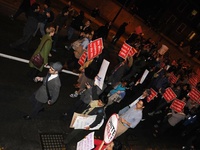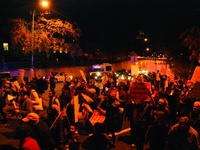At about 10:30 p.m., roughly 120 demonstrators—mostly Harvard students—linked arms and created a circle in front of the John Harvard Statue within which they began to assemble the tents.
As the protesters were constructing their tent city, Nelson emerged and attempted to convince the occupiers to move the tents to Tercentenary Theatre, where they would be less disruptive.
Protesters rejected her suggestion but said they would consider relocating the tents if they become too troublesome.
Nelson ultimately agreed to allow the tent city to camp in front of University Hall and asked to meet with the protesters on Thursday regarding the future of the occupation. The protesters’ terms for the meeting include adhering to their principle of consensus-based decision making and inclusive participation.
“I would like this meeting to be the beginning of a conversation,” Nelson said.
Harvard Kennedy School Lecturer Timothy P. McCarthy ’93 said that relocating the protest to the Law School campus earlier in the night was a way of assuring that the demonstrators could assemble and make their statement heard.
“This country was founded on the freedom of speech, of assembly, of petition, of religion, and of the press. Tonight, the country seems to deny the most essential freedom,” McCarthy told a crowd while at the Law School. “The press could not get in, so the people who speak will come to a place where the press can hear us, where we can be heard, where we can be seen.”
Throughout the night, various protesters—including several Harvard employees—voiced their concerns about economic conditions across the country. Other concerns included stalled contract negotiations and employment benefits.
“I’m here because I think this is one of the most important social uprisings in modern American history,” McCarthy said. “I believe deeply that this is a moment in America’s history that requires such a people’s movement. I’m happy to be part of it.”
He also said that the University has a responsibility to the community.
“If Harvard is going to be a place that produces people with power, then Harvard must be an institution where the public good is more important than private profit,” McCarthy said. Earlier, he told a crowd that “Harvard has economists that teach us that profits are more important than people.”
Protesters said that they wanted to bring a public dialogue to Harvard regarding the University’s role in the country and, more broadly, the world.
“Harvard is one of the most well-known private institutions of the world. We have a lot of clout with what we do,” said Evelyn M. Atkinson, a third year Law School student. “I’d say that the public footprint of a private institution like Harvard is really big.”
Sahil A. Khatod ’14 shared Atkinson’s view about the University’s responsibility.
“My frustration with Harvard has to do with the fact that there isn’t a dialogue about what’s happening off campus,” Khatod said.
–Staff writer Jose A. DelReal can be reached at jdelreal@college.harvard.edu.










